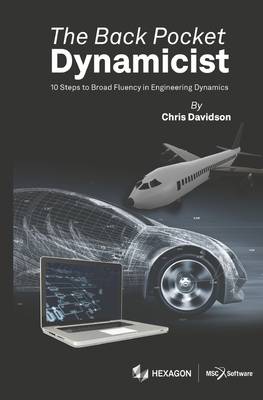
- Afhalen na 1 uur in een winkel met voorraad
- Gratis thuislevering in België vanaf € 30
- Ruim aanbod met 7 miljoen producten
- Afhalen na 1 uur in een winkel met voorraad
- Gratis thuislevering in België vanaf € 30
- Ruim aanbod met 7 miljoen producten
Zoeken
Omschrijving
See sample pages on my Author Page! A sound knowledge of dynamics has long been an integral part of an engineer's tool chest. The Back Pocket Dynamicist spans a wide range of engineering dynamics topics encountered in aerospace, automotive, and general machinery applications. Using a concise yet detailed approach, it provides a straightforward and logical treatment of rigid body dynamics, linear systems and transforms, transient and frequency response, modal methods, random vibration, control systems, hydraulic systems, and even fatigue under dynamic loading. While the focus is on providing the reader with a robust foundation in engineering dynamics principles, there is a conscious effort to reinforce how these principles influence real-world engineering problems. Rarely will you find one book that covers such a wide and inter-related set of concepts in the field of dynamics. In fact, there are approximately 250 topics covered, including, for example, complex stiffness, observability, Bauschinger effect, modal synthesis, ergodicity, convolution, quaternion, Hamilton's Principle, inverse kinematics, hydraulic inductance, state transition matrix, and many more. And this book is not an overview. Each subject is treated rigorously and many fully-worked example problems are provided. The book is based on the author's 35 years of experience of work in the field. Whether you are a practicing engineer, an engineering manager, or even a student, this book is sure to provide valuable mathematical and intuitive insights not provided elsewhere. After reading The Back Pocket Dynamicist, you will have a new appreciation for the complex but elegant field of engineering dynamics. The Ten Steps (Chapters): Chapter 1 - Rigid Body Kinematics
Chapter 2 - Rigid Body Dynamics
Chapter 3 - Linear Systems and Transforms
Chapter 4 - Transient Linear Systems
Chapter 5 - Frequency Response
Chapter 6 - Combining FEA and MBD
Chapter 7 - Random Vibration
Chapter 8 - Control System Dynamics
Chapter 9 - Hydraulic Systems
Chapter 10 - Dynamic Fatigue Prediction Also included are four very informative appendices: Appendix A - Lagrange Equations from Variations
Appendix B - The Euler Parameter Formulation
Appendix C - Relating Torque and Momentum
Appendix D - MBD Formulation from the Lagrange Equation
Chapter 2 - Rigid Body Dynamics
Chapter 3 - Linear Systems and Transforms
Chapter 4 - Transient Linear Systems
Chapter 5 - Frequency Response
Chapter 6 - Combining FEA and MBD
Chapter 7 - Random Vibration
Chapter 8 - Control System Dynamics
Chapter 9 - Hydraulic Systems
Chapter 10 - Dynamic Fatigue Prediction Also included are four very informative appendices: Appendix A - Lagrange Equations from Variations
Appendix B - The Euler Parameter Formulation
Appendix C - Relating Torque and Momentum
Appendix D - MBD Formulation from the Lagrange Equation
Specificaties
Betrokkenen
- Auteur(s):
- Uitgeverij:
Inhoud
- Aantal bladzijden:
- 368
- Taal:
- Engels
Eigenschappen
- Productcode (EAN):
- 9780578936260
- Verschijningsdatum:
- 25/08/2021
- Uitvoering:
- Hardcover
- Formaat:
- Genaaid
- Afmetingen:
- 148 mm x 222 mm
- Gewicht:
- 793 g

Alleen bij Standaard Boekhandel
+ 229 punten op je klantenkaart van Standaard Boekhandel
Beoordelingen
We publiceren alleen reviews die voldoen aan de voorwaarden voor reviews. Bekijk onze voorwaarden voor reviews.











